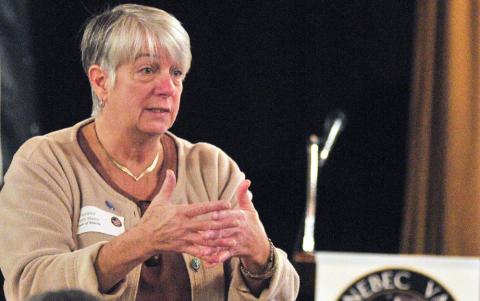The Hayes for Maine campaign recently filed a legal complaint against Secretary of State Matt Dunlap, alleging that his office is stifling the campaign's ability to distribute campaign material to voters and collect Clean Elections contributions on primary election day.
At the same time, the secretary of state's office asserts that it is following the state's election laws.
Newell Augur, legal counsel for Hayes for Maine, told me in a phone conversation that they were told "in no uncertain terms" more than once that the campaign was not allowed to engage in campaign activity at polling locations on primary election day.
The secretary of state's office, according to Augur and the legal complaint, cited an election law, Title 21-A §682, which states:
"2. Influence prohibited. On public property within 250 feet of the entrance to the voting place as well as within the voting place itself, a person may not:
A. Influence another person's decision regarding a candidate or question that is on the ballot for the election that day; or
B. Attempt to influence another person's decision regarding a candidate or question that is on the ballot for the election that day."
And...
"3. Advertising prohibited. A person may not display advertising material; operate an advertising medium, including a sound amplification device; or display or distribute campaign literature, posters, palm cards, buttons, badges or stickers containing a candidate's name or otherwise intending to influence the opinion of any voter regarding a candidate or question that is on the ballot for the election that day on any public property located within 250 feet of the entrance to either the voting place or the building in which the registrar's office is located. The term "sound amplification device" includes, but is not limited to, sound trucks, loudspeakers and blowhorns."
Augur and the complaint assert that the law does not apply to Terry Hayes' campaign because she is not "on the ballot for the election that day."
The campaign further says it had no issue displaying and distributing campaign material and collecting $5 Clean Elections contributions at polling locations in 2017. Hayes for Maine reached out to the secretary of state's office in late April, declaring its intentions to do so again on June 12, only to be told it couldn't.
Augur says the campaign was told on two separate occasions that the campaign could not have volunteers at polling locations on June 12 before they decided to file the legal complaint. But he added that it was not without good faith.
According to Augur, he was ready to file the legal complaint on May 16. He reached out to Secretary of State Matt Dunlap to inform him of his intentions, he was asked to wait, and the secretary of state's office sent the campaign the following memo:
"It is our interpretation that this is a type of signature collection activity which may be allowed by the warden pursuant to Title 21-A section 662(4), subject to space availability. Persons collecting signatures may not solicit a voter’s signature until the voter has completed voting. Accordingly, the effort to gather Clean Election Act signatures/contributions should be located near other signature gathering efforts, ideally in an area where only voters who already have voted will have access. If the only area where the volunteers can locate is accessible by voters who have not yet voted, as well as voters who have voted, then the signature gatherers must not solicit the signature/contribution until after the voters have voted (i.e., when they are on the way out of the voting place)."
The memo makes no mention of §682. It only says the campaign has to wait until after voters cast a ballot, and are located where local elections administrators permit signature gathering at the polling location.
I called the secretary of state's office for clarification on how the law applies to independent candidates on primary election day -- when independents are not on the ballot. The office would not comment on the lawsuit, but re-emphasized what the memo stated.
I was also given a copy of the "State of Maine 2018 Guide to Ballot Access," and directed to the section on "Restricted Activity." Again, the guide says the 250 feet rule applies to people who want to influence the vote for an election that day.
Augur says after the campaign received the memo, he again contacted the secretary of state's office, asking them to clarify in the memo that §682 did not apply to the Hayes for Maine campaign, and says they refused. So the campaign filed its complaint.
"The memo is a classic bait-and-switch," Augur went on record to say.
"The rules governing our democracy have been written by party leaders and special interests to protect their power and limit voters’ voices and choices," the Hayes for Maine campaign stated in a press release.
"For example, independents are required to collect twice as many signatures as the party candidates to gain ballot access. Independents running as Clean Elections candidates receive fewer Clean Elections dollars than either party nominees using the system. Independent candidates also do not have party committees to coordinate campaign strategy and spending on their behalf. The misapplication of the Maine law to deny an independent candidate the opportunity to engage with voters on June 12, 2018 is just latest example."
There is not very much time for this legal complaint to be resolved. Additional briefs and replies need to be filed and there is just under two weeks before the June 12 primary elections.
Terry Hayes was the first to file and qualify for the November ballot. She is a certified Clean Elections candidate, and is relying mostly on public funds to run a competitive election going into November.
